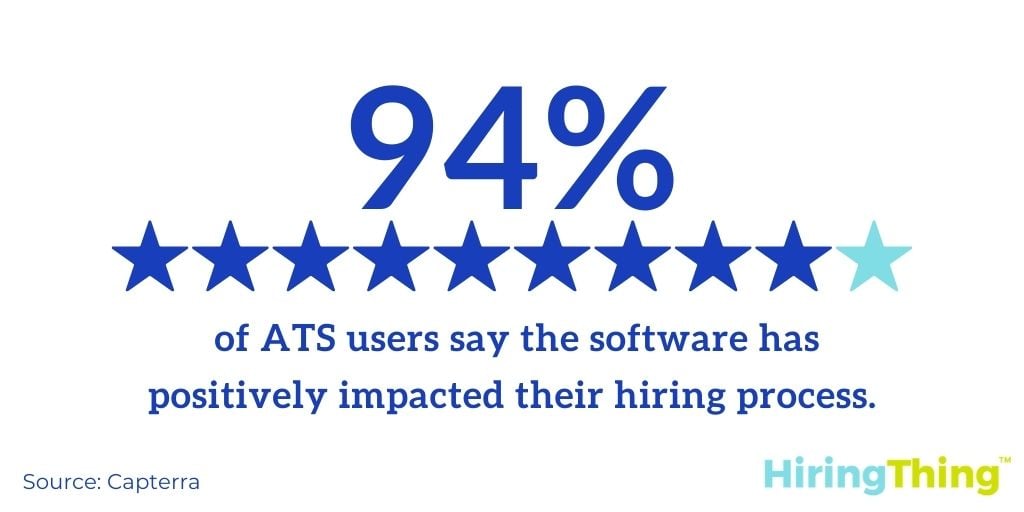What is a Private Label Applicant Tracking System?
Private Labeling an Applicant Tracking System Takes White Labeling an Applicant Tracking System to the Next Level
A private label applicant tracking system, or ATS, is a platform that companies can purchase from a specialized developer and then tailor to meet their specific needs. Think of it as a custom-made suit for your hiring process—tailored, user-friendly, and designed to make the job of finding the right candidates smoother, faster, and, well, better.
Now, private labeling isn’t some newfangled concept. It’s actually a more specialized form of white labeling. And yes, the two terms are often used interchangeably, but let me assure you—they’re not the same. White labeling is essentially branding someone else’s product as your own. Private labeling takes it a step further, adding bespoke workflows and customizations to suit specific business needs. It’s all under the white-label SaaS umbrella, but private labeling is like white labeling with extra sparkle and flair.
At HiringThing, we do both. And while we’re quite proud of our reputation as the go-to white-label ATS provider, it’s the private label partnerships that make our work truly shine. They’re what keep our partners coming back, year after year. But here’s the thing—private labeling isn’t exactly a term you hear tossed around at dinner parties. It’s a niche concept, which is why we’re here to break it all down for you: what it is, why it matters, and how it can work for your organization.
Table of Contents
- What is an Applicant Tracking System?
- What is Private Labeling?
- The Benefits of a Private Label ATS
- How a Private Label ATS Drives Revenue
- Who Can Benefit from a Private Label ATS?
- The HiringThing Advantage
What Is An Applicant Tracking System?
Let’s start at the beginning. An applicant tracking system, or ATS, is software designed to help companies organize, automate, and optimize their recruiting process. Imagine a centralized digital hub where resumes, applications, and other key hiring data live in perfect harmony. It’s a tool that helps businesses craft job postings, manage applications, and guide candidates and recruiters alike through the hiring maze.
.jpg?width=1920&name=Blog%20Pull%20Quote%20Template%20-%201920x1080%20(3).jpg)
A good ATS has the power to transform a recruiting strategy to become more productive, profitable, and efficient—98.9% of Fortune 500 companies use an ATS to streamline and strengthen their hiring, and 94% of recruiting systems say adopting an ATS has positively impacted their hiring process.
ATS Statistics
Here’s the kicker: a good ATS isn’t just a tool—it’s a game-changer. Research shows that 98.9% of Fortune 500 companies rely on ATS software to make hiring more efficient. And guess what? It works. More than 94% of users say their ATS positively impacts their hiring process.

But don’t just take my word for it. The data speaks volumes:
- 78% of companies using an ATS say it makes their recruiting easier.
- 86% of ATS users say ATS use has helped them hire faster.
- 78% of ATS users say ATS use has improved the quality of their hires.
- An ATS can bolster social media recruiting, which SHRM reported decreased time-to-fill for 71% of non-salaried management positions, 67% of management, 59% of executive/upper management roles, and 53% of non-management, hourly employees.
- Applicant tracking systems are integral to recruiting marketing—Aptitude Research found companies who invest in recruiting marketing are 3x more likely to improve the candidate experience, 2x more likely to improve job candidate conversion rates, and 2x more likely to improve overall recruiting decision-making.
- 75% of professional recruiters use applicant tracking systems to organize their pipelines.
- 75% of large companies rely on applicant tracking systems.
- 70% of recruiting professionals believe investing in technology is the best way to solve recruiting challenges.
- 86% of recruiters believe modern hiring is more like marketing than ever—to be successful, modern hiring strategies must consider the wants and needs of the job seeker. 54% of Gen Z candidates won’t apply if they feel your organization’s methods are outdated, and 50% of Gen Z and Millennial job seekers consider how much technology is used in the application process and won’t complete an application they think takes too long.
An ATS isn’t just software—it’s a competitive edge in today’s hiring market. And if you’re in the business of recruiting, it’s practically a must-have.
What is Private Labeling?
Let’s dig deeper into this private labeling business. At its core, private labeling is when a company buys software from a SaaS provider and customizes it to meet their specific needs. For ATS platforms, this might mean tailored workflows, seamless API integrations, or single-sign-on functionality.
Here’s where private labeling distinguishes itself from white labeling. A white-labeled product is essentially an off-the-shelf solution with your brand slapped on it. Private labeling, however, offers the flexibility to build, tweak, and refine that product to align with your unique business goals. It’s branding plus functionality, giving you the power to offer a truly proprietary solution.
Private Label vs. White Label Applicant Tracking System
You may have also heard private labeling called “white labeling.” Many people use private labeling and white labeling interchangeably (white labeling is a bit more prominent). However, subtle differences exist between these two models, namely customizations.
White-labeled platforms are produced by a SaaS company, outfitted with the white label customer’s branding, and sold to their clients as a proprietary solution.
Private labeling takes white labeling a step further. Private labeling allows companies to brand a SaaS product as their own or work with the private label developer to customize the platform to fit their organization’s specific needs. In the case of an ATS, bespoke workflows, add-ons, and functionalities can be customized to fit the needs of any organization that partners with the private-label provider.
Think of it this way: All private label solutions are white label solutions, but not all white label solutions are private label. Private labeling adds that extra layer of customization that can make all the difference.
.jpg?width=940&name=White%20Label%20vs.%20Private%20Label%20(1).jpg) By investing in white and private labeling solutions, organizations can increase the scope of their offerings and thus increase their value.
By investing in white and private labeling solutions, organizations can increase the scope of their offerings and thus increase their value.
.jpg?width=940&height=788&name=Shanas%20Favorite%20(1).jpg)
Private labeling allows organizations to rapidly add new HR technology offerings, quickening their responsiveness to customer challenges. Companies that partner with a private label SaaS provider don’t have to spend time and money developing a solution they may not have background expertise on and can instead direct their resources towards growing their business and delighting their customers.
A True Partnership
When organizations use a white label SaaS solution, they’re often just applying their branding to another company’s product and then monetizing that solution as their own—it’s a traditional vendor-customer relationship.
Conversely, a private label partnership is a true partnership, allowing customers to capitalize on a trusted vendor’s pre-existing SaaS solutions and knowledge so that they can focus on their core product or solution—a good private label partnership allows vendors and developers to grow their trust and rapport.
Private labeling isn’t a situation where purchasers get a branded solution and are then on their own. Private label developers are deeply invested in their customer’s success. They work with their clients to ensure their product has the workflows and capabilities they need, act as support during the initial launch, and provide continued support through the tenure of the partnership in terms of marketing, sales, engineering, customer support, customer success, and product development. Marketing collateral? Great content? A robust knowledge base? Dynamic webinars? New customer solutions? These can all be part of a working private label partnership.
Here at HiringThing, our client's success is our success. That’s why we’ve trademarked Support Beyond Compare™. Check out an example how we’ve worked with our clients to achieve their goals.
The Benefits of Using a Private Label Applicant Tracking System
Organizations invest in private label applicant tracking systems for a variety of reasons.
- Hiring is a Universal Business Need
- Saves Time and Money
- Seamless API Integration
- Increased Customer Acquisition
- Customize Your ATS to Match Your Brand
- Expand Market Share
- The Demand for Hiring Technology Solutions is Growing
- Remain Competitive
- Team Expansion
- Frequent Product Enhancements
- Established Third-Party Relationships
Hiring is a Universal Business Need
Every business needs to hire. Hiring was the top business challenge for 2021, and the great resignation we’re currently in the midst of ensures this challenge will extend into 2022. By selecting the right applicant tracking system you ensure recruiting and hiring are strategic, streamlined, and efficient.
Saves Time and Money
An in-house solution may seem like the right move, but they frequently derail internal business priorities and go over budget. Building an app from the ground costs time and money. It also involves putting a significant amount of money into getting it off the ground.
According to DevSquad, building a minimum viable product (MVP) takes an average of 2 to 10 months (but can take much longer). Applicant tracking is a saturated market, and creating a competitive SaaS in this field requires a more sophisticated product and functionality—when you private label, you’re putting the hypothetical time and money in the hands of the ATS experts.
While private label SaaS users can expect to pay an implementation fee which typically starts around $5,000 (in addition to monthly usage fees), development costs for a complex application (like an ATS) average in the hundreds of thousands of dollars.
Private label is an excellent solution for any organization looking to expand their solutions without investing large sums of money.
Seamless API Integration
Data integration is a valuable benefit of a private label ATS—it removes double data entry, reduces procurement contracts, and creates a secure transfer between an ATS and other HR platforms. Partnering with a private-label ATS means you choose which features work for your solution and allows you to customize the solution to align best with your and your customers’ goals.
Increased Customer Acquisition
Increasing the scope of your offerings will make you more attractive to customers. A private label applicant tracking system allows you to expand with ease and speed, in turn increasing your user base.
Customize Your ATS to Match Your Brand
Customizing your ATS with your branding means that your customers will be even further delighted by the solutions you offer and become the brand ambassadors critical to growing your business.
Expand Market Share
The ATS market is expected to reach $2.22 billion by 2027, and the market’s compound annual growth rate (CAGR) is expected to increase by over 5% by 2024.
The Demand for Hiring Technology Solutions is Growing
HR tech spending grew 57% from 2020 to 2021. Even pre-pandemic, 74% of organizations planned to increase spending on HR tech. Recruiting (and retention) is the top challenge driving HR technology acquisition.
Remain Competitive
While almost all large organizations and Fortune 500 companies are using applicant tracking systems, only 35% of SMB have adopted ATS use, which means that 65% of that market is still up for grabs. Additionally, 57% of recruiters at large organizations aren’t satisfied with their applicant tracking systems, which means there’s even more opportunity for expansion.
Team Expansion
Private label solutions typically come with development, product, customer service, sales, and marketing teams that can stretch an organization’s bandwidth, expand your expertise, and allow your team to focus on critical, revenue-generating tasks. Private labeling gives you access to a team of new supporters, collaborators, innovators, and thinkers.
Frequent Product Enhancements
Hiring needs change frequently. To retain existing ATS customers and attract new ones, you’ll want a platform that is consistently improving and offering features that strengthen the recruiting process even more—when you private label an applicant tracking system, you don’t have to worry about product enhancements because there’s already an expert product team on the case.
Established Third-Party Relationships
In addition to a vast network of job boards, competitive private label applicant tracking system developers have established relationships with third-party vendor integrations—everything from background checks to video interview applications and skills testing.
How Private Label Applicant Tracking Systems Grow Revenue
A study of 512 SaaS companies showed monetization was 4x more efficient than acquisition and 2x more efficient than retention in improving growth. Monetization can mean finding ways to increase your value (by acquiring a solution to solve your customer’s number one challenge) and raising prices to reflect that new value. It can also entail monetizing the ATS value-add as a feature you know customers will happily pay additional fees to integrate into their suite of offerings. Organizations that readily use third-party branding can find themselves needing to defend markups, but private labeling eliminates those discussions since your ATS presents as a proprietary solution.
A private label applicant tracking system can drive revenue by:
- Creating a new topline revenue source with monthly subscription and usage fees.
- Reducing the losses associated with client churn.
- Creating a competitive advantage that drives growth in market share.
Organizations typically make money from an applicant tracking system utilizing one of the following revenue models:
Usage-Based Pricing
Pricing based on usage allows you the flexibility to set your margins, bundle with other services, or create packages that work for your product.
Subscription-Based Pricing
Utilizing a subscription-based pricing model allows you to go to market with a familiar structure to your end-users (Netflix, gym membership, etc.). This approach is painless for all parties and sets clear expectations around monthly packages. Your clients can flex their subscription packages up and down as their needs change while you enjoy a revenue share each month.
Location-Based Pricing
Ideal for multi-location or franchise businesses, location-based pricing can be a game-changer. This style program offers fixed operating costs at each location, so there are no surprises. Pricing scales for larger operations and hiring needs so companies can choose to bundle into more significant tech stack dues, allowing for a new revenue stream on top of added value to a franchise model.
PEPM Pricing
Designed to support PEOs, ASOs, HROs, and payroll providers specifically, a per-employee-per-month (PEPM) model allows your recruiting solution to fall into place with existing services seamlessly. At a low cost to your organization, a PEPM billing model can drive revenue and provide competitive services your clients are seeking. This pricing structure often allows small businesses to have a feature-rich tool to recruit at a cost lower than they can purchase independently. PEPM billing allows your ATS offering to fit into the overall puzzle and complete the total HR picture.
Flex Pricing
If you’re on the Flex Pricing model, your customers already have access to your ATS—it’s just a matter of them deciding to turn it on. This subscription-based plan is designed so that your clients can quickly scale up or down to meet their recruiting needs and that you only pay for what’s being used.
Who Benefits from Using a Private Label ATS?
Private label ATS platforms aren’t just for big corporations. They’re a valuable tool for HR tech organizations (HROs), vertical SaaS providers, professional associations, and anyone looking to offer robust hiring solutions. At HiringThing, we’ve seen our clients—across industries—unlock new potential with private labeling. The question isn’t who benefits; it’s who wouldn’t?
Here’s the thing: At HiringThing, we don’t just offer private label ATS solutions—we redefine what they can do. Our partnerships are built on collaboration, innovation, and a commitment to your success. With our trademarked Support Beyond Compare™, we’re with you every step of the way, from initial launch to continued growth.
So, whether you’re a seasoned ATS user or just exploring your options, one thing is clear: A private label ATS isn’t just software. It’s a strategy. And when you partner with HiringThing, it’s a strategy built for success.
The HiringThing Advantage
HiringThing is a modern recruiting and employee onboarding platform as a service that creates seamless talent experiences. Our white label solutions and open API enable HR technology and service providers to offer hiring and onboarding to their clients. Approachable and adaptable, the HiringThing HR platform empowers anyone, anywhere to build their dream team.




